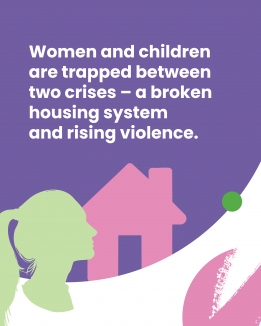Housing solutions are core to ending violence against women
Published: Friday, November 28, 2025

Housing solutions are core to ending violence against women. This is a key finding of a major new report by the National Women's Council launched today (28th November) which shows the need to clearly recognise this mutually reinforcing relationship between homelessness and domestic, sexual and gender-based violence (DSGBV). The report highlights the importance of recognising housing as a crucial part of the solution to ending violence against women.
The report is the result of a conference on the intersection between housing and different forms of violence against women which NWC held in September. It identifies effective policy solutions guided by the lived experiences of women and the knowledge of a wide range of experts from across civil society, agencies, and policy makers. It illustrates the need to address the disconnect between homelessness, housing, and domestic, sexual and gender-based violence services. Recommendations include survivor-informed policy making, coordination and cooperation between agencies, and secure emergency and long-term accommodation to ensure safety, dignity, and equality for all victim-survivors of DSGBV.
Marginalised and minoritised groups of women – including Traveller and Roma women, migrant women, disabled women, women experiencing addiction, and girls in the care system, among others—experience additional barriers to accessing DSGBV and housing services. The report includes a range of targeted solutions for each of these specific groups.
Ivanna Youtchak, Violence Against Women Coordinator at the NWC said:
“This report highlights the close connection between housing and violence against women and identifies effective solutions informed by the lived experiences of women. It is imperative that policies are shaped with and by survivors so that services meet their real needs. Survivors often deal with several services: housing, Gardaí, health, and child services, and social protection — yet these systems rarely talk to each other, putting more weight on survivors' shoulders. We need an integrated approach, where these services communicate and cooperate with one another. This would minimise the traumatic impact on survivors and ensure that women and children don’t fall through the cracks or end up trapped in an abusive situation because they have nowhere to go. Stable housing is critical to safety, to dealing with trauma and ultimately to recovery. That’s why we need to see a priority response for victim-survivors of DSGBV, which not only includes access to safe accommodation for women and children, but also more trauma-informed and cost-effective solutions such as rehousing the perpetrator rather than the woman victim-survivor who is usually the protective parent, or the child.”
“Our report also outlines the way diverse groups of women experience housing precarity differently and may be more vulnerable to abuse and exploitation. One example explained at the conference is how the shortage of accessible and affordable student accommodation can push migrant and female international students into overcrowded and unsafe situations—in some instances entering sex for rent arrangements. We urgently need sex for rent exploitation to be outlawed and the ability of victim-survivors to access legal protections.”
Denise Charlton, Chief Executive of Community Foundation Ireland added:
“The Community Foundation, our philanthropists and supporters are clear our mission of Equality for All in Thriving Communities cannot be achieved without ending violence against women. While this report can make for uncomfortable reading, it is a must read for everyone who shares our mission. The recommendations are practical and achievable, and as the report makes clear are essential if we are a society which truly respects human rights and full equality.”
Other key recommendations outlined in the report include:
- Making housing a human right and declaring a housing emergency working to dramatically increase the supply of all types of housing across the country.
- Improving access to legal protection/s for victim-survivors of DSGBV.
- Investigating and addressing the relationship between homelessness and mental health.
- Ensuring all victim-survivors of DSGBV receive high quality trauma informed services, recognising that different women will need different solutions.
The report and conference were supported by the St Stephen’s Green Trust and Community Foundation Ireland. ‘Joining the Dots’ was written from evidence, ideas and testimonies from services, survivors, policy makers and political parties.
You can read the report here.
